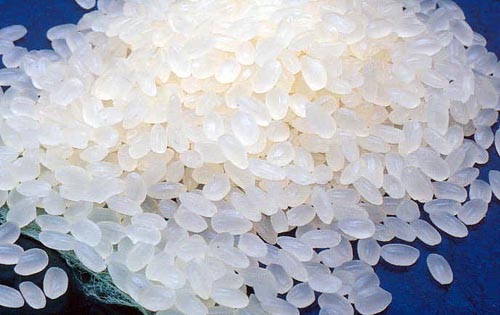VARIANT NAMES: Dami (rice), Yingmi (hard rice), Jiashu.
ORIGIN: The seed of Oryza sativa [Gramineae].
CHEMICAL COMPOSITION: Containing 75% of starch, about 8 % of protein, 0.5 to 1% of fat, and a little vitamin B.
NATURE, FLAVOR AND CHANNEL TROPISM: Sweet in flavor and warm in nature, acting on the channels of the spleen and stomach.
EFFICIENCIES AND INDICATIONS: Invigorating the middle-jiao and replenishing qi, strengthening the spleen and regulating the stomach, relieving thirst and restlessness, and arresting dysentery and Infant Diarrhea.
DIRECTIONS: To be eaten steamed, made into gruels, or compounded into medicated diet or medicated gruel. The patient with endogenous cold should eat less.

SUPPLEMENT: Polished long-grained nonglutinous rice and polished glutinous rice: These two kinds of rice and the polished round-grained rice both originate from the same kind of plant. The seeds of the polished long-grained rice are longer and thinner, but less glutinous and expand more; while the seeds of polished glutinous rice are divided: some are the same as those of polished long-grained nonglutinous rice, some are the same as those of polished round grained rice, which are rounder and shorter, but differ in that they contain more dextrin, with the strongest glutinosity and little expansion. Polished long-grained non-glutinous rice basically has the same functions and indications as polished glutinous rice and polished round-grained rice, except that it is warm in nature, and its excessive eating will cause heat, thus easily resulting in dry stools. Click here to learn Parkinson's Disease (PD) in TCM.

![Diseases, Symptoms, tcm, [tcmwindow.com]](/uploadFile/adImg/2015/4/24/6de633b8-0a7a-4546-868a-02389edf5c65.png)





